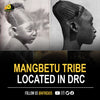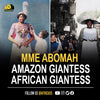
It started at the Oprah Winfrey Leadership Academy for underprivileged girls in South Africa, where Maduka rose to become dean and saw the girls go on to pursue PhDs, fight for social justice and even share the stage with Michelle Obama, accomplishments she reels off with pride.
It continued when she got to Netflix in early 2014 and didn’t see any content from Africa. “I naturally just asked why,” she says, eventually helping lead a global film powerhouse as its director of international original films.
Now Maduka is placing her boldest bet yet, leaving the streaming giant last year to work on her own projects. “I’m taking a break from corporate life and speaking more about telling our stories,” she says, declining to reveal any more details.
Her fascination with film was forged early. Born in Port Harcourt, Nigeria’s oil capital, to a doctor dad and engineer mum from southeastern Nigeria, the family relocated to the Maryland suburbs of Washington, D.C., in the 1990s. The area has a huge population of Nigerian immigrants, and as a young girl she made regular visits to a salon belonging to one of them, to get her hair braided.
There, she would stare transfixed at the Nollywood movies playing on the screen in all their melodramatic glory. At home, there were bits of her African heritage floating around in the food, Igbo language and physical memorabilia as the self-confessed goofball and “former prankster” grew up. There was also her grandmother, who constantly preached the need for girls to be educated.
Then came her time at Ivy League schools Cornell and Harvard where she bagged a history degree and an MBA, respectively, with a stint at the Sorbonne in Paris between. She breezed through Goldman Sachs, McKinsey and the Clinton Foundation before settling for four years at the Oprah Academy. She joined Netflix in 2013, when the service was a U.S. phenomenon — but not yet a global one.
“It was an environment that encourages you to ask ‘why’ all the time, and come up with a solution,” she says of her pledge to tell more African stories. “At that time, we were getting ready to go global and constantly thinking about new audiences and growing the business.” During her tenure, Netflix acquired dozens of titles across Africa, and commissioned original flicks from Nigeria and South Africa.
“Nigerians’ films are a mainstay on Netflix now but it hasn’t always been so,” says Lagos-based film critic Wilfred Okiche. “A lot of the credit must go to Maduka, whose work with the streamer licensed a couple of films and put them on the global map. There is some observation that maybe she could have done more, especially with supporting and engaging local filmmakers, but she left a pretty decent catalog at Netflix.”
The deal for Netflix’s first African original series, Queen Sono, was struck during Maduka’s exit in 2019. She had brought its director, Kagiso Lediga, on board with the first African original movie, 2017’s Catching Feelings. While protesting that she was “just a matchmaker,” Maduka reluctantly acknowledges that the match paved the way to showcase a heroic female protagonist of color.
The atmosphere is already changing on the ground with more inclusive hiring in the entertainment industry, says young Lagos-based filmmaker Ifeoma “Fizzy K” Chukwuogo. “As long as there are women of color and minorities that are making the decisions behind the scenes as executives and such, it will become a normal thing,” Chukwuogo says.
African filmmakers in particular need to decolonize their stories as new channels democratize storytelling, Maduka says. At a recent TEDx talk, she explained that Hollywood films and culture have given rise to a Western hegemony and thus “Western culture is the default lens through which we all see ourselves.”
She chipped away at that notion, often bringing in scripts where women served in prominent roles behind the camera or in front of it. Maduka struck the deals for Oscar-nominated Hungarian drama On Body and Soul and Mexico’s Roma, a global sensation that won four Oscars.
“I wonder if maybe as a woman of color, these narratives are subconsciously resonating with me, but I also put my personality on the back burner and get things done even if I wouldn’t watch the content,” she explains. “Maybe it’s that the women I work with really just pitch great stories. It’s not like the standards were lowered for women.”
The interest of audiences within and outside the U.S. was a teachable moment for industry executives in Hollywood long fed fat on hypotheses that there is no audience for a film outside a particular country, Maduka says.
Take this year’s historic Best Picture triumph for South Korea’s Parasite. It coincided with her arrival as a full voting member on the Academy of Motion Picture Arts and Sciences. She participated as a juror in more than 20 film festivals over a six-year period, and considers herself “a constant student of cinema,” plowing through old films and always drawn to the international and unconventional.
The projects she loves most hit close to home: She had persistent nightmares after 276 teenage girls were kidnapped in northern Nigeria by the Islamist group Boko Haram. The Chibok schoolgirls kidnapping led her to team up with Beasts of No Nation author Uzo Iweala to create a documentary about one of the escapees yearning for her best friend. Called Waiting for Hassana, it premiered at Sundance in 2017.
“Funa Maduka has a seat at the head of the table,” read the citation from the OkayAfrica 100 Women List for 2019. In between working long hours molding destinies or calibrating art, she’s found time to pursue vegan baking as a hobby in order to not feel guilty about calories while satisfying her sweet tooth. She wants to buy a guitar to satisfy a lifelong itch to learn a musical instrument, though it’s unclear if that will ever become a reality.
What’s closer to reality is Maduka’s work on a new historical drama about women, if whispers in Nollywood are to be believed. But she is tight-lipped about her future, intent on keeping her plans just as hidden as her subjects — for now.
by Eromo Egbejule






